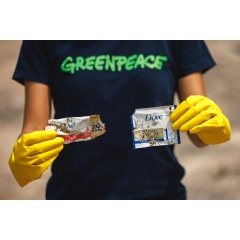Global South cities lead shift to refill systems from sachet economy
Amid the scourge of plastic pollution in the region, initiatives from cities in the Global South are leading the transition towards reuse and refill systems, showing that these are viable alternatives to the sachet economy.
This is evident in a Greenpeace Philippines report[1] on its project, Kuha sa Tingi (combining the Filipino expression “makuha sa tingin” or “to be taken at a glance,” and “tingi” or the Filipino culture of buying in small quantities), which mainstreams reuse and refill systems in cities in order to reduce single-use plastic (SUP) pollution. The project introduced small-portion refill systems for personal and home care products at highly competitive prices in neighborhood stores, and allowed consumers to refill their reusable containers with the exact quantities they need. According to the report, the initiative avoided over 50,000 sachets, enabled consumers to save an average of 201% when opting for refills over sachets, and increased retailer profit by around 15% during the pilot period of 6 to 8 weeks.
The scourge of sachet pollution by manufacturers is one of the main drivers of plastic pollution in the country.[2] However, sachet production remains largely unregulated, highlighting the urgent need for alternative solutions as well as comprehensive policies to address this problem.
The results of the project underscore the economic viability of refill systems, which are beneficial for both consumers and local businesses. Similar initiatives have been seen in neighboring Indonesia, where the nonprofit YPBB[3] also encouraged consumers to practice reuse and refill by purchasing products from bulk stores, while small businesses such as coffee shops are also shifting to refill.[4]
However, although these initiatives are successful, the lack of policy support for refill and reuse systems, and the reduction of SUP production remain key barriers. Especially in countries dependent on sachets, the report points to the need to legislate and enforce upstream and midstream interventions such as bans on single-use plastic products, a phasedown in production, redesigned distribution systems, and waste-free reuse models to effectively address the plastic crisis.
Greenpeace believes that the development of a strong Global Plastics Treaty presents a massive opportunity to establish standards and regulations that will accelerate the development and transition to reuse and refill systems. Provisions on reuse and circularity can establish a global framework that harmonizes different approaches as well as targets across different sectors. This would fast-track the adoption of sustainable solutions and create support for research and development around these models.
Marian Ledesma, Greenpeace campaigner said: “To solve the plastic crisis, governments need to drive large-scale investment in reuse and refill systems, like Kuha sa Tingi, as well as institute strong policies for reducing and eventually eliminating SUPs. Corporations must also be compelled to change the way they do business and stop reliance on SUPs. This will secure environmental justice, contribute to better health outcomes, advance climate action, and protect the well-being of every person. A strong Global Plastics Treaty will enable all these through a just transition away from single-use plastics.”
Narciso Marcelo, a store owner from the Philippines, said: “Aside from selling products as refills, through this project, I learned that plastic waste has become a large problem in society. Every time we buy sachets, we merely throw them anywhere. If we purchase refills, we will be able to avoid plastic waste altogether.”
For more information, check out the full report at act.gp/reuserefill.
Notes:
[1] Greenpeace Philippines, Kuha sa Tingi: Bringing back sustainability into Filipino tingi culture, 2024: act.gp/reuserefill
[2] GAIA, Plastics Exposed: How Waste Assessments and Brand Audits Are Helping Philippine Cities Fight Plastic Pollution, 2019: https://www.no-burn.org/wp-content/uploads/Plastics-Exposed-2nd-Edition-Online-Version.pdf.
[3] Yayasan Pengembangan Biosains dan Bioteknologi (YPBB) is a nonprofit environmental organization based in Bandung, Indonesia.
[4] Bulk Stores and Reuse Initiatives; Reuse in Business Sector: https://reusesolutions.org/stories/
[5] Photos from Kuha sa Tingi stores. Please check the document for captions and photo credit.
Image Caption:
Marian Ledesma, Greenpeace Philippines Zero Waste Campaigner picks up pieces of plastic trash from the company Dove around Freedom Island at Las Piñas City, Philippines. This wetland part of Manila Bay, called the Las Piñas–Parañaque Critical Habitat and Ecotourism Area (LPPCHEA), is a 175-hectare protected area. It is always filled with plastic trash that comes from the ocean. The amount of plastic trash here does not stop even with the continuous shore clean-up by various groups. Photo by Jilson Tiu/Greenpeace
( Press Release Image: https://photos.webwire.com/prmedia/8/319624/319624-1.jpg )
WebWireID319624
This news content was configured by WebWire editorial staff. Linking is permitted.
News Release Distribution and Press Release Distribution Services Provided by WebWire.
